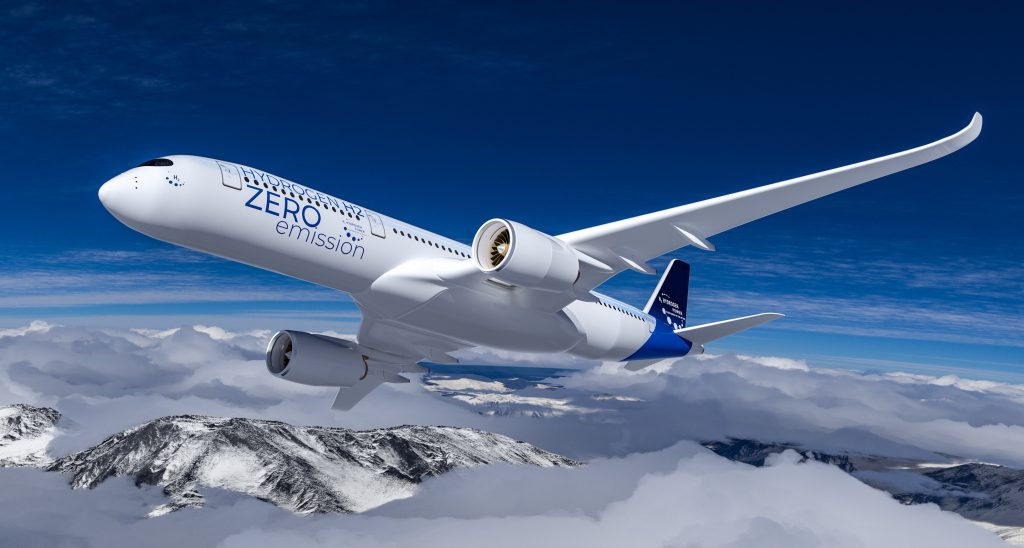Flying High – soon with net-zero emissions. (Image: Shutterstock)
The aviation industry is on the verge of a significant transformation with the launch of the world’s first hydrogen-based synthetic aviation fuel demonstration plant at Oxford Airport in the UK. Led by OXCCU, a spin-off company from Oxford University, the plant is based on new technology that promises to make synthetic aviation fuels more economically viable and scalable.
OXCCU’s facility utilizes a novel one-step process that directly converts hydrogen (H2) and carbon dioxide (CO2) into long-chain hydrocarbons. The method is based on OXCCU’s iron-based catalyst, which bypasses the multi-step conversions required in traditional methods, making the process significantly more energy-efficient and cost-effective. The impact of this innovation could be profound, as it promises to make synthetic aviation fuels more economically viable and scalable, thereby addressing one of the most significant challenges in the production of Sustainable Aviation Fuels (SAF).
Towards Net-Zero
This development is a crucial part of the aviation industry’s effort to achieve net-zero emissions. Aviation is under increasing pressure to reduce its environmental impact, and the ability to produce cost-effective synthetic fuels on a large scale could be a real game-changer. Synthetic kerosene, produced by combining captured carbon with green hydrogen, is seen as one of the most promising long-term solutions to replace traditional aviation fuel. Unlike biofuels, which are limited by the availability of raw materials, the production of synthetic kerosene is theoretically unlimited, as it is based on water, renewable energy, and carbon dioxide—components that can be sourced in an environmentally friendly and sustainable way.
Airbus Promotes a Sustainable Supply Chain
Airbus, one of the major players in the aviation industry, is also working to build a sustainable supply chain to support the widespread adoption of SAF. The company has set ambitious global targets to incorporate 15 percent sustainable aviation fuel into its fuel mix by the end of 2024. Airbus aims to increase this to at least 30 percent by 2030. The company is pushing for the development of regulatory frameworks and strengthening of the supply chain infrastructure to achieve these goals. SAF can reduce CO2 emissions by an average of 80 percent over the fuel’s lifecycle compared to conventional fossil fuels. Certain types of SAF, such as eSAF produced with sustainable electricity, can reduce emissions by up to 99 percent.
Pushing the Revolution
The future of aviation fuels depends on the ability to produce SAF on a scale that meets the global demand for aviation fuel. Innovations like those developed by OXCCU offer a pathway to carbon-neutral air travel. The push for SAF is being driven by regulatory pressures, technological advancements, and a growing awareness of the need for sustainable solutions in the face of climate change.
An increasing number of governments, airlines, and energy companies are driving the global adoption of SAF. For example, the European Union has promoted the use of SAF among its member states, while companies like Shell are heavily investing in the development of synthetic kerosene. This collective effort is crucial to overcoming the technical and economic challenges in scaling up SAF production.
The OXCCU plant at Oxford Airport is just the beginning. As more demonstration plants are commissioned and technologies continue to develop, the vision of a sustainable, low-carbon future for aviation is becoming increasingly closer to reality.
Read More:
- Interesting Engineering: ‘World’s 1st’ hydrogen-to-synthetic jet fuel demonstrator plant to open in London
https://interestingengineering.com/energy/worlds-first-synthetic-aviation-fuel-plant - Hydrogen Insight: ‘World first’ | Aramco-backed start-up announces hydrogen-to-synthetic aviation-fuel demonstration plant at UK airport
https://www.hydrogeninsight.com/transport/world-first-aramco-backed-start-up-announces-hydrogen-to-synthetic-aviation-fuel-demonstration-plant-at-uk-airport/2-1-1690716 - AIN: Some Experts Say Best Use of Hydrogen Is Making Sustainable Aviation Fuels
https://www.ainonline.com/news-article/2023-06-08/some-experts-say-best-use-hydrogen-making-sustainable-aviation-fuels - Hydrogen Central: Zero to Accelerate Synthetic Sustainable Aviation Fuel Adoption with Airbus
https://hydrogen-central.com/zero-to-accelerate-synthetic-sustainable-aviation-fuel-adoption-with-airbus/ - Shell Media: World first – synthetic kerosene takes to the air
https://www.shell.com/business-customers/aviation/100years/flying-together/synthetic-kerosene.html

